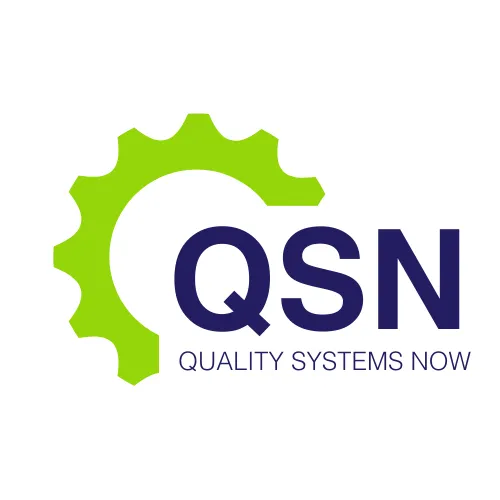NEWS

Up-skilling Organisations in Core Areas of GMP and ISO Compliance
The evolving landscape of global regulatory requirements and technological advancements necessitates continual learning and competency development within organisations. At QSN Academy we specialise in equipping professionals and organisations with the technical knowledge, practical skills, and regulatory insight required to meet the highest standards of compliance. We explore the core areas of GMP and ISO compliance, the importance of systematic up-skilling, and the scientific rationale for structured workforce development.
The Scientific Basis for Compliance Training
Regulatory compliance in the life sciences is based on evidence, reproducibility, and traceability. The systems and processes underpinning GMP and ISO standards are designed to ensure that products are consistently manufactured and controlled to the quality standards appropriate to their intended use.
Non-compliance is often the result of human error, inadequate training, or lack of understanding of regulatory expectations. Scientific literature and inspection trend analyses by regulatory bodies such as the TGA, FDA, and EMA consistently highlight that deficiencies in staff training and competence are major contributors to compliance breaches. Therefore, up-skilling is not a peripheral activity—it is central to risk mitigation, quality assurance, and product integrity.
Core Principles of GMP and ISO Standards
GMP is a globally recognised system covering the manufacture and testing of pharmaceutical products. It ensures that products are consistently produced and controlled according to quality standards. Core GMP principles include:
Defined procedures and validated methods
Trained and qualified personnel
Documented traceability and data integrity
Quality risk management
Change control and deviation management
Similarly, ISO standards such as ISO 9001 (Quality Management Systems), ISO 17025 (Laboratory Competence), and ISO 13485 (Medical Devices) provide structured frameworks to ensure system efficiency, data reliability, and continual improvement.
Understanding and applying these standards requires deep knowledge of both scientific processes and quality systems. Training must therefore be technical, contextualised, and aligned with current regulatory expectations.
Identifying Training Needs
Before implementing an up-skilling strategy, organisations must perform a detailed Training Needs Analysis (TNA). This process involves:
Mapping current competencies against regulatory and operational requirements
Evaluating gaps in knowledge or performance
Consulting audit reports, CAPAs, and performance reviews
Forecasting future needs based on changes in product lines, regulations, or technologies
The scientific approach to TNA relies on objective data and measurable outcomes. For instance, repeated deviations in aseptic processing may signal a training gap in cleanroom behaviour, which can be rectified through targeted microbiological contamination control training.
QSN Academy utilises structured TNA methodologies tailored to laboratory, manufacturing, and quality assurance roles, ensuring that training programs are precise and impactful.
Key Areas for Up-skilling
Quality Management Systems (QMS)
A robust QMS is foundational for both GMP and ISO compliance. Personnel must understand how quality systems function and their individual responsibilities within those systems. Core QMS training includes:
Document control and version management
Internal audits and management review
CAPA implementation and root cause analysis
Risk assessment frameworks (e.g., FMEA, HACCP)
This training fosters a culture of quality ownership and system thinking, essential for maintaining regulatory alignment and continuous improvement.
Data Integrity and ALCOA+
Data integrity remains a major focus of global regulatory inspections. ALCOA+ principles—Attributable, Legible, Contemporaneous, Original, Accurate, plus Complete, Consistent, Enduring, and Available—define the expectations for data governance.
Up-skilling in this area involves:
Understanding electronic and paper-based record controls
Applying audit trails and metadata controls
Identifying and managing data integrity breaches
Ensuring compliance with 21 CFR Part 11 and Annex 11
Training must include practical exercises, such as identifying poor documentation practices and correcting them in accordance with SOPs and guidance documents.
GMP for Manufacturing Personnel
Operators, supervisors, and production managers require comprehensive GMP knowledge relevant to their roles. Training should cover:
Cleanroom protocols and contamination control
Equipment calibration and maintenance
Process validation and in-process controls
Materials management and traceability
Scientific content should be aligned with PIC/S guidelines, TGA requirements, and relevant international standards. Role-specific training ensures that personnel understand not only what to do but why each step is critical to product quality and patient safety.
ISO 17025 and Laboratory Practices
Testing laboratories require personnel who can demonstrate competence in method execution, result interpretation, and compliance with ISO 17025 requirements. Up-skilling should address:
Method validation and measurement uncertainty
Proficiency testing and inter-laboratory comparisons
Sample handling and chain of custody
Reporting formats and traceability
QSN Academy offers role-based ISO 17025 programs that emphasise both theoretical knowledge and practical application, ensuring laboratories maintain accreditation readiness and scientific credibility.
Risk-Based Thinking and Regulatory Intelligence
The latest versions of GMP and ISO standards require organisations to integrate risk-based thinking into their quality systems. Training in this area includes:
Identifying and assessing quality and compliance risks
Implementing risk mitigation plans
Staying current with evolving regulatory guidelines
Integrating regulatory intelligence into decision-making
Staff trained in risk-based thinking are better equipped to make proactive, informed decisions that protect both the organisation and the end user.
Methods of Training Delivery
To ensure training effectiveness and compliance with regulatory expectations, the method of delivery is as important as the content. Scientific principles of adult learning and knowledge retention support a blended training approach, including:
Instructor-led training with subject matter experts
Case-based workshops simulating real compliance challenges
On-the-job training and competency assessments
E-learning modules with interactive quizzes and progress tracking
Training should be structured with clear learning outcomes, assessments to confirm comprehension, and documentation to support audit requirements. QSN Academy provides digital and in-person delivery modes designed to meet the needs of diverse workforce structures, including shift-based teams and remote personnel.
Measuring Training Effectiveness
Regulators expect that training is not only delivered but that it is effective. This means training programs must include post-training evaluation and performance monitoring, including:
Pre- and post-training tests
Observation and verification of practical competence
Monitoring of deviation and error trends following training
Feedback loops for continuous improvement
These measures align with the Plan-Do-Check-Act (PDCA) cycle and ensure that training directly contributes to system improvement and compliance assurance.
Organisational Benefits of Up-skilling
Up-skilling is an investment in operational excellence. The benefits extend beyond compliance and include:
Reduced risk of regulatory non-compliance and warning letters
Improved product quality and batch release efficiency
Increased staff engagement and retention
Enhanced reputation and business continuity
Training empowers staff to identify and address problems early, communicate more effectively, and uphold the scientific and ethical standards required in life sciences industries.
Conclusion
Up-skilling in GMP and ISO compliance is a strategic imperative for organisations in the therapeutic goods, pharmaceutical, and biotechnology sectors. In an increasingly complex and regulated environment, scientific competence, regulatory literacy, and a quality-driven mindset are critical for maintaining accreditation, ensuring product integrity, and safeguarding public health.
QSN Academy provides structured, scientifically grounded training programs that meet regulatory expectations and empower organisations to build a capable, compliant workforce. Through tailored content, rigorous methodology, and industry-aligned expertise, we help clients turn compliance from a challenge into a core organisational strength.
